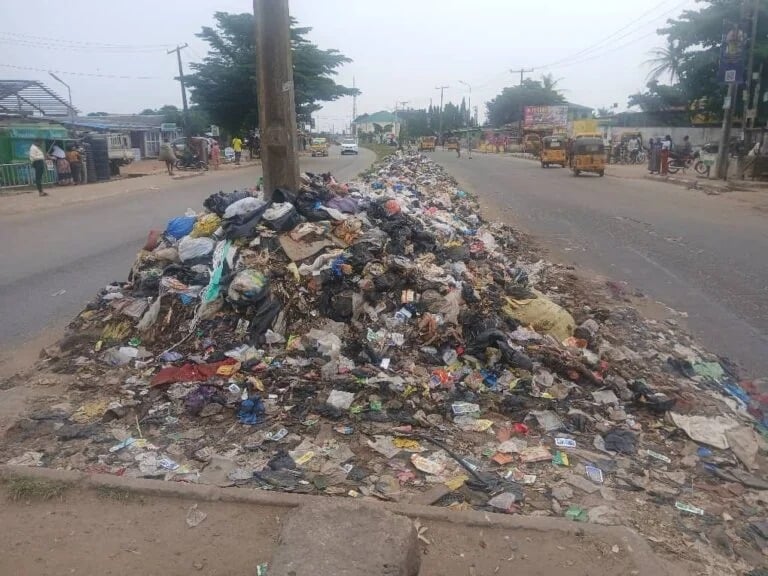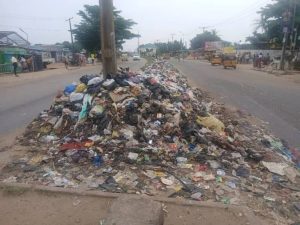
LAGOS RESIDENTS RAISE ALARM OVER IRREGULAR WASTE COLLECTION, ESCALATING HEALTH RISKS
By Aishat Momoh. O.

Residents across several Lagos communities have voiced growing frustration over what they describe as increasingly erratic waste collection by Private Sector Participant (PSP) operators, warning that the lapses are fuelling indiscriminate dumping and widespread public health hazards.
In separate interviews with the News Agency of Nigeria (NAN) on Sunday, residents from Ikorodu, Ayobo, Alagbado, Shasha, Ikotun, Akesan, Ajao Estate, and the LASU–Iba Road corridor complained of long gaps in waste evacuation, forcing many households to burn refuse or dump it in gutters especially during rainfall.
NAN observed mounting heaps of refuse in several neighbourhoods, with AIT Road in Alagbado and parts of Ikotun visibly affected after weeks of non-collection.
In Ikorodu, businesswoman Miss Adekoya Toyosi said PSP operators no longer maintain predictable schedules.
“Collection sometimes drops from three times a month to once a month. If the waste is much and the PSP doesn’t come around, we use the gutter when it rains, and sometimes we burn it when it’s sunny,” she said, noting residents pay between ₦500 and ₦700 depending on waste volume.
Another resident, Mr Timilehin Ogunnariwo, said PSP trucks often arrive already full, leaving inner streets neglected.
“I use three drums in my compound, but when waste accumulates, rats scatter it everywhere. Leakage from overflowing trucks around the local market has also become a recurring hazard,” he said.
Fashion designer Mrs Ajibola Mafolayan added that she burns her waste three to four times weekly, despite its health risks.
“Burning gives us catarrh and cough, but we have no choice since the PSP does not come to our area,” she lamented.
Market waste supervisor, Mrs Ogundinmu Mariam, said council evacuation happens irregularly. During the rainy season, she noted, “the whole place becomes messy and smelly.” Some residents, she said, now rely on informal haulers.
In Shasha, Egbeda, Mrs Stella Lawrence criticised what she described as “selective service delivery,” saying some estates enjoy regular pickups while surrounding streets are abandoned.
“Many people now rely on banned cart pushers,” she added.
Along the LASU–Isheri Road axis, civil servant Mr Kunle Ayodele said PSP operators had not visited in more than three weeks.
“The heaps of dirt pose a risk of disease outbreak. The closure of the Igando dumpsite and relocation to Badagry have worsened turnaround time and diesel costs,” he said.
Ikotun resident and journalist, Mr Ugochukwu Eze, faulted the billing system, saying PSP operators charge residents even when service is not rendered.
“They behave like the former NEPA that bills you whether service is rendered or not,” he said, calling for a pay-as-you-go model.
In Ajao Estate, Mr Ugochukwu Okoro said the once-clean neighbourhood is “gradually being littered with waste” due to reduced PSP visits despite regular payments.
However, some areas particularly Lekki Phase 1 reported steady service. Civil servant Mrs Ese Afolabi commended PSP operators for consistent Monday pickups.
“Their consistency keeps the environment clean and healthy,” she said.
Speaking on challenges, the President of the Association of Scrap and Waste Pickers of Lagos, Mr Friday Oku, acknowledged concerns about scavengers scattering waste. He said training and community sensitisation programmes are being expanded next year, although many informal pickers avoid training for fear of taxation.
The President of the Association of Waste Managers of Nigeria (AWAMN), Dr Olugbenga Adebola, said PSP operators remain committed to effective service delivery but face structural constraints at disposal sites.
“There are challenges at the disposal sites which we, together with the government, are discussing at the highest level,” he said. “Short-, medium-, and long-term solutions are being worked on.”
Residents across affected communities urged the Lagos State Government and the Lagos Waste Management Authority (LAWMA) to restore predictable waste collection schedules to curb indiscriminate dumping, burning, and the associated environmental and health risks.
